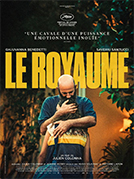The Kingdom

| Original title: | Le Royaume |
| Director: | Julien Colonna |
| Release: | Vod |
| Running time: | 108 minutes |
| Release date: | Not communicated |
| Rating: |
Mulder's Review
Julien Colonna's first feature, Kingdom, casts a long shadow reminiscent of The Godfather, not only because one of its characters is nicknamed the Godfather, but also because it depicts the complex dynamics of the mafia within a family. Set in the sunny but volatile landscape of Corsica in 1995, a period marked by conflict between nationalist factions and crime syndicates, the film focuses on a beleaguered mafia clan struggling to maintain its hold amid an onslaught of adversaries.
At the heart of this turbulent saga is Pierre-Paul Vitali (Saveriu Santucci), a mafioso reminiscent of a relaxed Don Corleone, who must protect his precarious leadership and teenage daughter, Lesia Vitali (the remarkable Ghjuvanna Benedetti), as they evade law enforcement and rival mobsters. The story unfolds as a captivating twist on the traditional mafia story, exploring the point of view of a young girl at the dawn of her womanhood, discovering the brutal realities of her father's world and her own potential path within it.
Julien Colonna's direction is marked by a precise, naturalistic style that captures the stifling, oppressive heat of a Corsican summer, using the island's beautiful Mediterranean landscapes as a backdrop for the unfolding drama. The film's progression is deliberate, with the first act focusing on the seemingly typical life of teenager Lesia Vitali - hanging out with her friends, enjoying the beach and nurturing a budding romance - until an abrupt change propels her into the violent world in which her father operates.
This transition is both shocking and fascinating, drawing the audience into the tension and uncertainty that define Lesia Vitali's existence. When Lesia Vitali is abruptly taken to an isolated villa where Pierre-Paul Vitali and his henchmen are hiding, the true nature of their relationship and the constant danger they face become clear. Following Lesia Vitali's journey, we witness her gradual immersion in her father's clandestine operations, her understanding deepening with each clandestine conversation and encounter.
Much of the narrative is seen through Lesia Vitali's eyes, a clever choice that maintains a sense of mystery and tension throughout the film. Julien Colonna's intimate knowledge of Corsica lends authenticity to the setting and the story, inviting viewers to piece together the puzzle alongside Lesia Vitali. As she becomes enmeshed in her father's world, the harsh reality of their existence becomes inescapable.
The director's choice to keep much of the violence off-screen until the last part of the film underlines the suddenness and brutality of the criminal world, making the action moments all the more striking. This approach, combined with Antoine Cormier's cinematography, which uses sober color tones and often frames scenes from Lesia Vitali's limited point of view, reinforces the film's immersive quality.
The strength of Le Royaume lies in its depiction of Lesia Vitali's evolution from a naive young girl to a person entangled in the difficult life her father leads. Ghjuvanna Benedetti's performance is captivating, capturing Lesia Vitali's internal conflict and her gradual acceptance of her father's world. Her transformation parallels the growing proximity of violence, which begins with distant reports but quickly becomes an inescapable reality. The film's climax, an exciting confrontation that reveals Lesia Vitali's true abilities, hints at the possibility of her escaping this life, although it remains ambiguous whether she wants to or not.
Julien Colonna's film is not just a whodunit, but a poignant exploration of family, loyalty and the cost of a life lived on the run. Pierre-Paul Vitali's monologue at a campsite, where he reveals the consequences of his lifestyle, is a defining moment, offering a glimpse of the human side of a man often perceived as a ruthless criminal. This moment is juxtaposed with a later revelation that underscores the ruthlessness necessary to survive in his world. The film's depiction of violence is stark and inglorious, reflecting the reality of organized crime in Corsica, where murder is a brutal, often public affair, and survival requires a constant state of vigilance.
Le Royaume is a perfectly mastered debut film that offers a fresh perspective on the crime genre, focusing on a young girl's coming-of-age in a perilous world. Julien Colonna's direction, combined with strong performances and a deeply authentic setting, result in a film that is both captivating and emotionally rich. Le Royaume stands out not only for its narrative and cinematographic technique, but also for its ability to capture the essence of Corsica's unique cultural and criminal landscape. It's a film that invites viewers to look beyond the surface of mafia life, revealing the personal costs and complex dynamics that underpin it.
The Kingdom
Directed by Julien Colonna
Produced by Hugo Sélignac, Antoine Lafon
Written by Julien Colonna, Jeanne Herry
Starring Ghjuvanna Benedetti, Anthony Morganti, Thomas Bronzini de Caraffa, Pascale Mariani, Saveriu Santucci, Andrea Cossu, Frédéric Poggi, Eric Ettori, Régis Gomez, Marie Murcia
Music by Audrey Ismael
Cinematography : Antoine Cormier
Edited by Albertine Lastera, Yann Malcor
Production companies : CHI-FOU-MI
Distributed by Ad Vitam (France)
Release date : November 13, 2024 (France)
Running time : 108 minutes
Seen May 24, 2024 at Gaumont Opéra Capucines, Room 1
Mulder's Mark:

